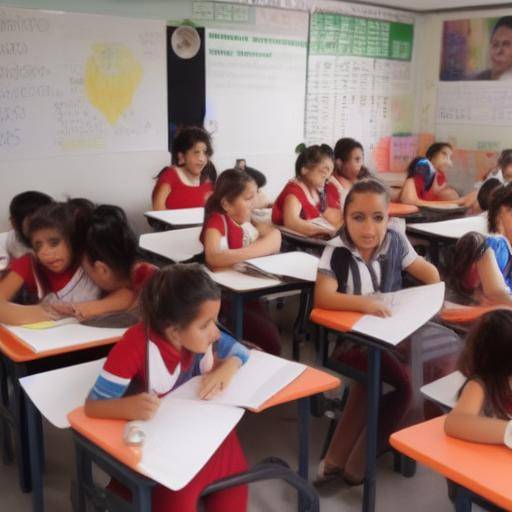
The importance of financial education in the training of students is becoming increasingly evident. With the growing complexity of the financial world, it is crucial that young people acquire skills in this area from an early age. In this article, we will explore the importance of incorporating financial education in schools, existing programmes, their inclusion in the educational curriculum and how this training can prepare students for a successful financial future.
Introduction
Financial education plays a key role in the lives of people. Understanding concepts such as savings, investment, credit and budget are essential skills for informed and responsible financial decision-making. However, in many cases, this training is not formally included in educational programmes, which leaves young people deprived of key tools for their future. In this regard, it becomes necessary to see how this issue can be effectively addressed in schools.
History and Background
The movement towards the inclusion of financial education in schools is rooted in the growing complexity of the financial world. As societies have evolved, understanding of financial aspects has become a vital skill. In many countries, recognition of the importance of financial education has led to initiatives to integrate it into the school curriculum.
Historical Initiatives
The impetus for financial education has led to a number of initiatives throughout history. From the creation of pilot programmes to the enactment of laws requiring the inclusion of this training in schools, different sectors have worked to promote this important area of knowledge.
Evolution and Development
The evolution of financial education has followed a dynamic course, adapting to technological advances and changes in financial systems. The development of new educational methodologies and the integration of digital tools have expanded the scope and effectiveness of this training.
Detailed Analysis
Financial education in schools offers many benefits, including the preparation of students to make responsible financial decisions, encourage long-term planning and reduce finance-related stress. However, it also poses challenges, such as effective integration into the curriculum and training of trained teachers in this field.
Benefits and Challenges
The benefits of financial education in schools go beyond basic financial knowledge. Students receiving this training are better prepared to manage their personal finances, plan their long-term goals and understand the functioning of the financial markets. However, the effective implementation of these programmes requires challenges such as the constant updating of the educational content and the training of teachers.
Current trends
Current trends in financial education focus on integrating practical approaches and real-world experiences into the school curriculum. The use of educational technologies and collaboration with financial entities and specialized organizations are shaping new strategies to involve students in learning financial skills.
Comprehensive review
As methods and approaches for incorporating financial education in schools are evaluated, it is crucial to consider the practical applications of existing programmes, as well as lessons learned from best practices implemented in different educational and geographical contexts.
Applications and Best Practices
The effective implementation of financial education in schools requires a comprehensive approach ranging from the selection of relevant teaching materials to the related training of teachers. Best practices also include collaboration with financial institutions and the integration of practical educational projects that enable students to apply their knowledge in real-world situations.
Comparative analysis
By comparing different educational programs and approaches in financial education, it is possible to identify similarities, differences and opportunities for synergy. Understanding how different educational systems address this issue can provide valuable insights into the most effective strategies to prepare students to face financial challenges.
Practical Tips and Accessible Recommendations
Providing practical advice and actionable recommendations on how to mainstream financial education in schools is essential to boost the effective implementation of these programmes. These councils should include strategies to involve students, recommended educational resources and approaches to assess the impact of financial education on the development of student financial skills.
Perceptions of Industry and Expert Reviews
Collecting and presenting perceptions of industry experts provides a valuable perspective on the implementation of financial education in schools and their implications for the future. Interviews or expert quotations, industry trends analysis and forecasts on the evolution of financial education can enrich the content and provide a comprehensive view of the topic.
Case Studies and Practical Applications
Detailed case studies showing practical applications of financial education in schools can illustrate the tangible benefits of these programmes. Analyzing the results, lessons learned and examples of different industries or geographic contexts provides an integral view of the impact of financial education on students.
Future Trends and Predictions
Exploring emerging trends related to financial education in schools and providing future predictions based on current data and expert views is crucial to understanding how this field will evolve in the future. Identifying potential challenges and opportunities in the area of financial education provides a valuable vision for long-term decision-making.
Conclusion
Financial education in schools plays a crucial role in preparing students to face financial challenges. In effectively addressing the inclusion of these programmes in the educational curriculum, significant opportunities will be created for young people to acquire the skills necessary to make responsible financial decisions in the future.
Frequently asked questions
1. Why is it important to incorporate financial education in schools?
The incorporation of financial education in schools is important because it prepares students to face financial challenges in their adult lives, promotes informed decision-making and fosters long-term planning.
2. What are the challenges in incorporating financial education into the school curriculum?
The challenges include effective integration into the curriculum, the training of trained teachers in this field and the constant updating of the educational content.
3. How can schools foster student participation in financial education?
Schools can foster student participation by using practical approaches, integrating digital tools and working with financial entities and specialized organizations.
4. What are the current trends in financial education in schools?
Current trends focus on integrating practical approaches and real-world experiences into the school curriculum, as well as the use of educational technologies to learn financial skills.
5. What benefits does financial education offer in schools?
Financial education in schools offers benefits such as preparing students to manage their personal finances, plan their long-term goals and understand the functioning of financial markets.
6. How can teachers incorporate financial education into their education?
Teachers can incorporate financial education into their education through the use of relevant educational resources, the application of practical approaches and the participation in professional development opportunities in this field.
With the effective implementation of financial education programmes in schools, future generations can be prepared to face their financial future with confidence. By providing students with the necessary tools and knowledge to make informed and responsible financial decisions, a positive impact on society as a whole is created.






















































